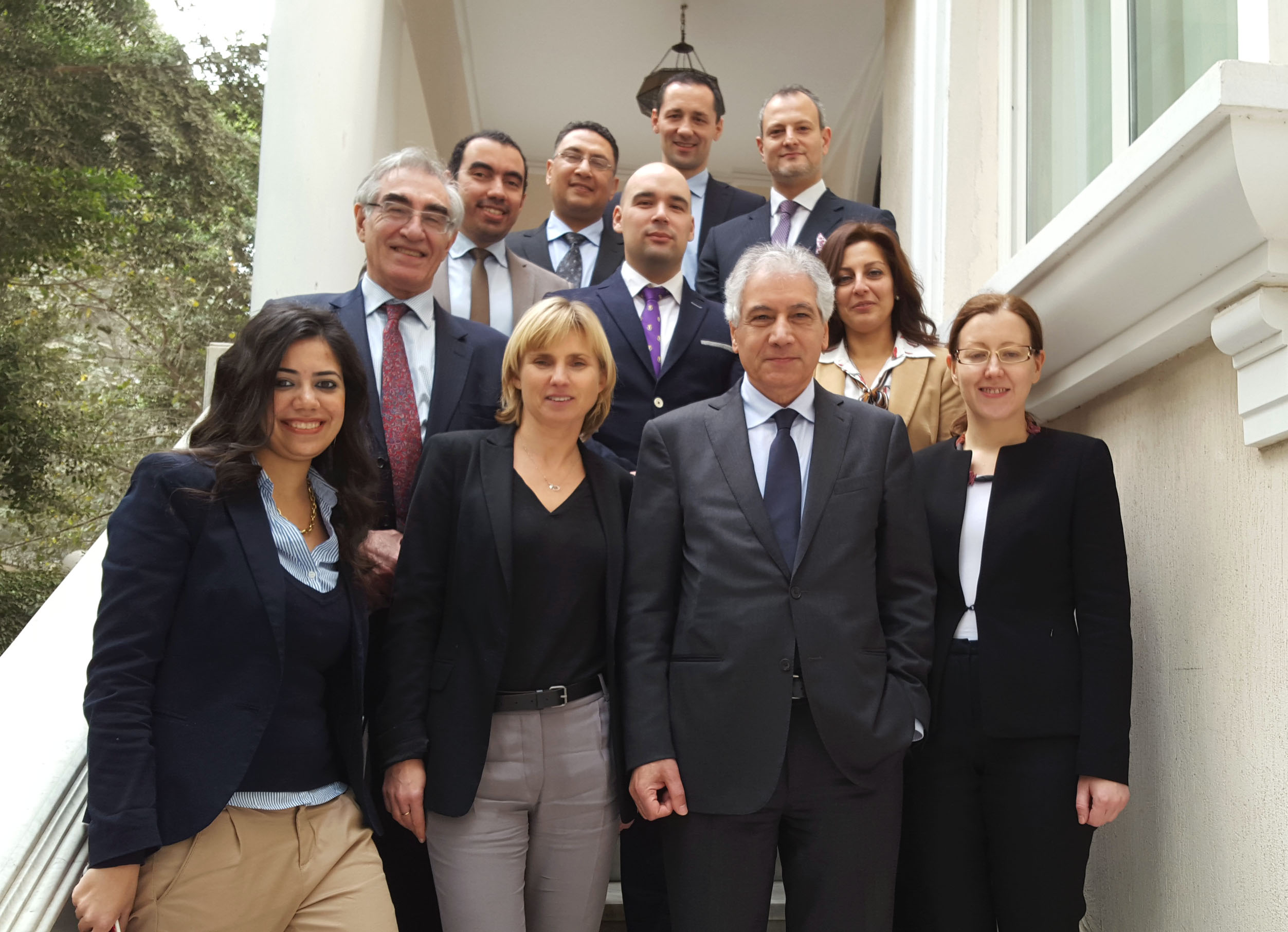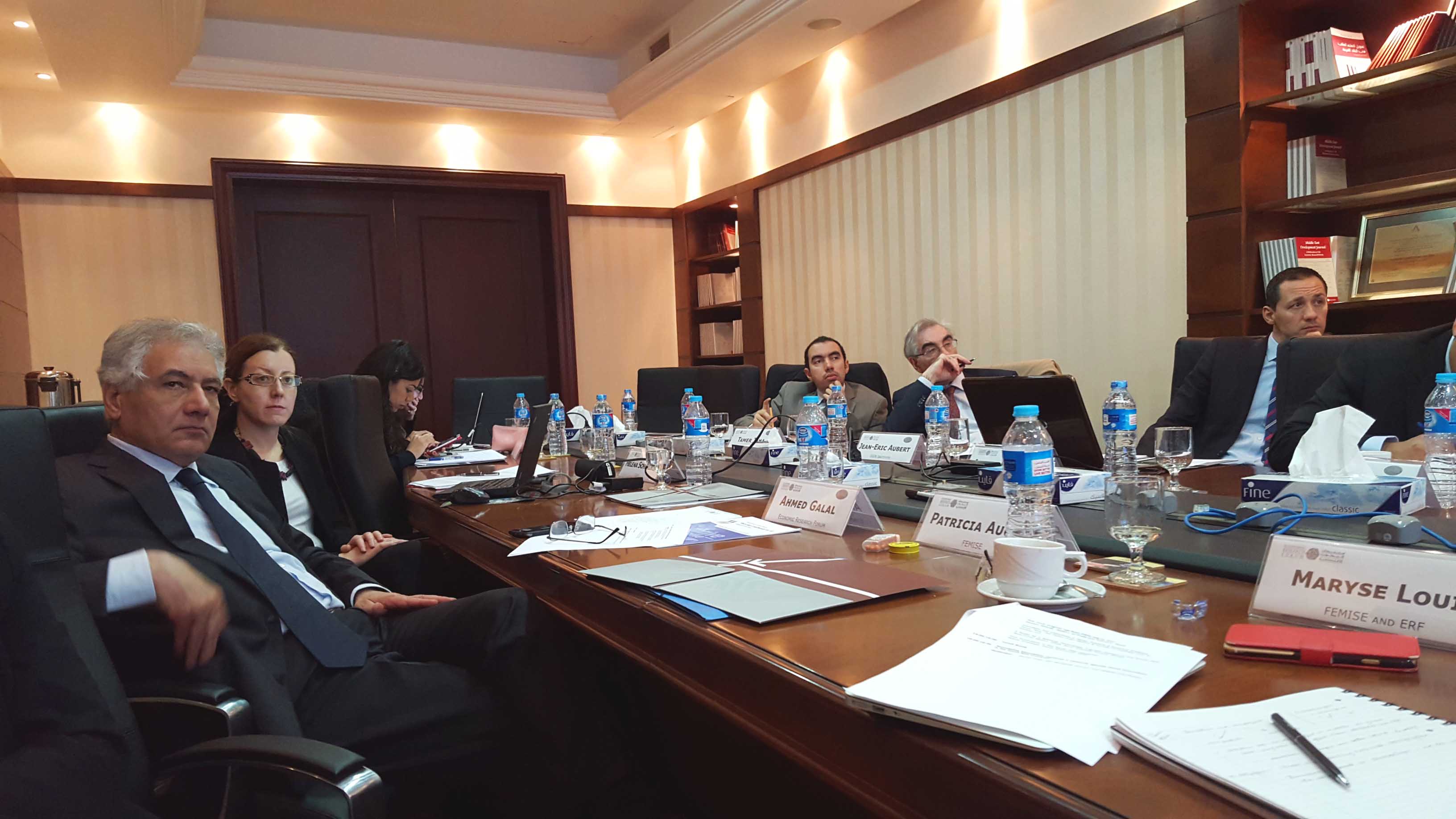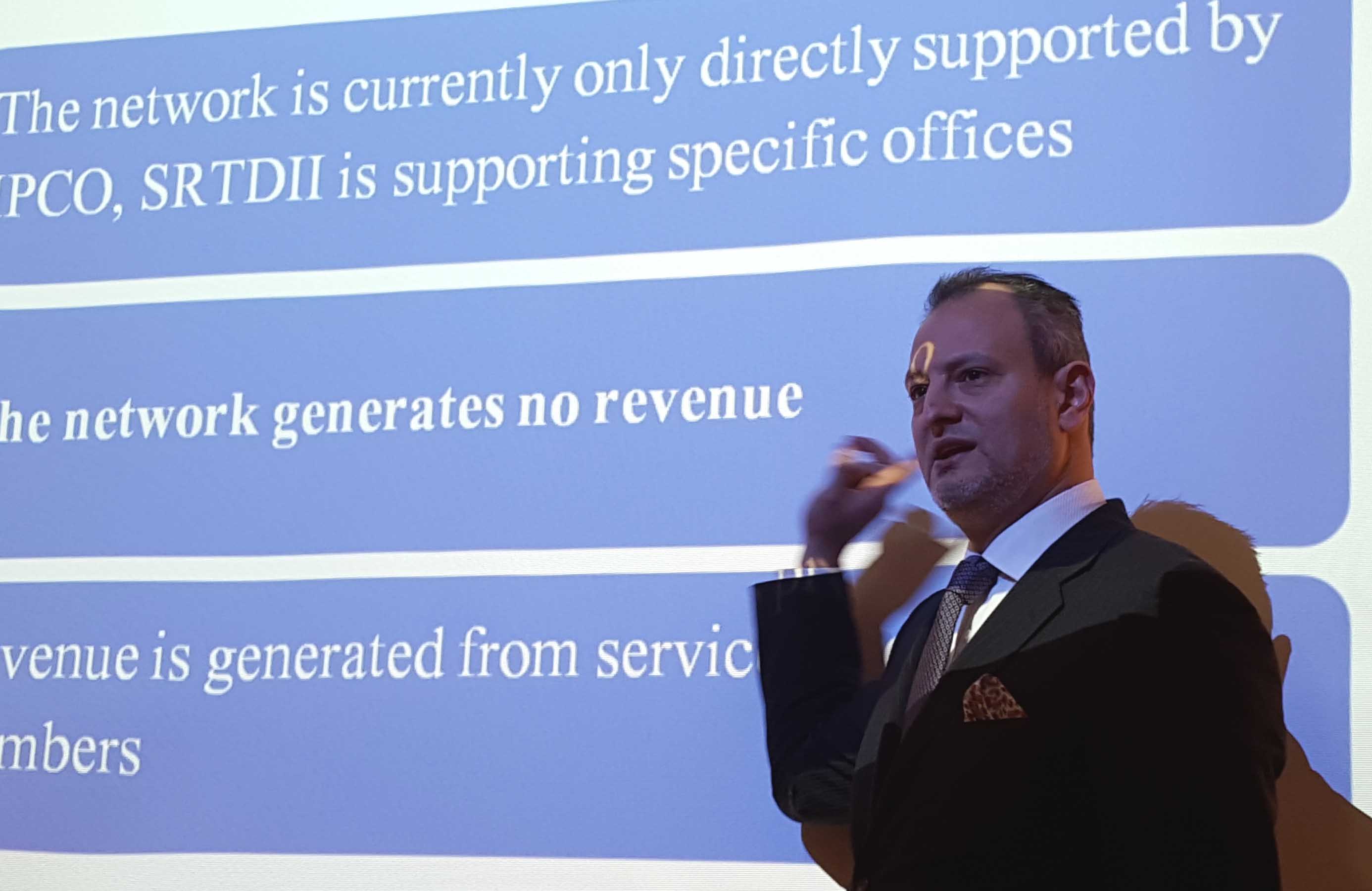
Participants at FEMISE and ERF Expert Group Meeting on: “Innovation: Towards a Research Agenda to Unlock South Med Potentials”, January 18th 2016, Cairo, Egypt.
FEMISE and ERF organized an Expert Group Meeting on: “Innovation: Towards a Research Agenda to Unlock South Med Potentials” on January 18th 2016 in Cairo, Egypt.
The objective of this joint ERF-FEMISE expert group meeting was to better understand the multiple facets of innovation, identify the factors that promote it and highlight the potentials and challenges of the South Med countries.
Dr. Ahmed Galal (President of FEMISE and Managing Director of ERF) initiated the meeting by asking some key questions to the experts to orient the discussion. Questions such as how can a country become a better innovator? What are the drivers of innovation? Theories help us to predict the future; but do we have the theories that guide in innovation?
The meeting took the form of a large brainstorming session, allowing to come up with interesting research questions on the topic of innovation that could be part of the future FEMISE research agenda on how to unlock the South Med potentials.
Participants first exchanged on the importance of properly defining and measuring Innovation. Prof. Jean-Eric Aubert (Former Lead Specialist at The World Bank and the OECD, Founder and President, SIGN Institute France) explained that innovation could be defined as the diffusion of (modest) newness in the economy in form of new products, new processes, new services, new organisational structures, etc. He also stressed the importance of the innovation context, highlighting that for the medium income countries, innovation systems are heterogeneous while in low income countries, innovation is considered “frugal”.

FEMISE and ERF Expert Group Meeting on: “Innovation: Towards a Research Agenda to Unlock South Med Potentials”, January 18th 2016, Cairo, Egypt.
The need to establish a successful IP policy for universities and research institutes was also a point of discussion. Dr. Anton Habjanič (Director, TechnoCenter at University of Maribor, Slovenija) stressed that Intellectual Property (IP) policy is a must-have tool. Meanwhile, enhancing entrepreneurship and boosting innovativeness at universities & research institutes requires a corresponding ecosystem (e.g. organized in accordance with the ″one stop shop″ principle), and IP Policy that encourages and provides incentives to researchers. The IP Policy has to be adapted in a manner that the institution is able to identify emerging inventions efficiently, assess and manage disclosed inventions in a systematic way, and addresses grand challenges.
For an innovative Mediterranean, it was stressed that there is need for cooperation in Research and Innovation between the South Mediterranean and the European Union. Mrs. Heba Gaber (Research and Innovation officer, Delegation of the European Union to Egypt) clarified that there are many strategies and road maps regarding Cooperation in Research and Innovation. The EU has recently issued an international cooperation strategy in line with Horizon 2020. Through the PRIMA co-funding initiative, the EU will also seek fostering cooperation between the South-Med and the EU in research and innovations in sectors such as “Water availability and management and food security”, “Renewable energy and efficiency” and others.
 Another point that was highlighted was related to the link between Innovation and Institutions in the MENA region. Mr. Tamer Taha (PhD Fellow at UNU-MERIT, & Founder of Istebdaa’ LLC. & Yomken.com) explained that South Med countries are very special with their institutions and their institutional framework. They suffer from informal constraints and rent seeking behavior and the performance of innovation is low in the region compared to other countries with the same level of human development. Mr. Taha presented his startup that tries to solve innovation challenges. “Yomken” is a model to solve this gap between the needs and demands of innovation.
Another point that was highlighted was related to the link between Innovation and Institutions in the MENA region. Mr. Tamer Taha (PhD Fellow at UNU-MERIT, & Founder of Istebdaa’ LLC. & Yomken.com) explained that South Med countries are very special with their institutions and their institutional framework. They suffer from informal constraints and rent seeking behavior and the performance of innovation is low in the region compared to other countries with the same level of human development. Mr. Taha presented his startup that tries to solve innovation challenges. “Yomken” is a model to solve this gap between the needs and demands of innovation.
Mr. Mohammed El Jafari (IPCO, Royal Scientific Society, Jordan) also presented a model for establishing a national technology transfer system that has a great enabler of creation of value from innovation. He stressed how iPark, a specific project within the Royal Scientific Society (RSS), tries to create jobs by supporting entrepreneurs and innovators. It provides innovation support through IPCO (which started as an office just to handle the IP assets within the Royal Scientific Society) and there is an incubator which is iPark that takes care of the entrepreneurship side. Since 2003, 13 thousand jobs were created with very little funding. If iPark was a company, it would have been among the largest 10 companies in Jordan.
Meanwhile, Mrs. Helena Schweiger (Senior Economist, EBRD, UK) highlighted some of the findings of a recent firm level study (WBG-EBRD-EIB MENA Enterprise Survey) that has for objective to understand the environment in which firms operate in a selection of MENA countries. Questions on whether firms have introduced any new or significantly improved products, processes, organizational or marketing methods or spent on R&D in the last three years, showed that most innovations in these firms are not ground breaking. The results also showed that, while South Med low tech sectors are less likely to acquire knowledge compared to their peers in Europe and Central Asia (ECA), these countries’ high tech and medium tech compare favorably.
Mrs. Schweiger made some suggestions of Policy Implications highlighting how :
- Firms would benefit from greater openness to international trade, and in particular more effective customs and trade regulations, both when exporting and importing,
- Government should facilitate improvements in the skills of the workforce and
- Restrictions to firm entry and exit as well as restrictions that give incumbent firms undue advantage should be removed.
Panelists proceeded to in-depth discussions on all these issues while a Roundtable discussion to go Towards a research agenda about innovation in the South Med countries served to identify crucial research questions on the innovation topic that each panelist considered important or relevant to the region.
For a more in-depth look at the discussions between participants you may click here for the Minutes of the ERF-FEMISE expert group meeting.
The presentations of each participant are available here:
| Jean-Eric Aubert Former Lead Specialist at The World Bank and the OECD, Founder and President, SIGN Institute France |
| Anton Habjanič Director, TechnoCenter at University of Maribor, Slovenija |
| Heba Gaber Research and Innovation officer, Delegation of the European Union to Egypt |
| Tamer Taha PhD Fellow (UNU-MERIT), & Founder of Istebdaa’ LLC. & Yomken.com |
| Helena Schweiger Senior Economist, EBRD, UK |
Mohamed Al-Jafari Royal Scientific Society, Jordan
|



